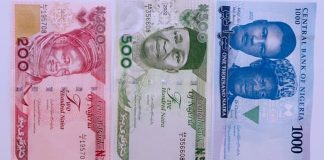The naira rebounded after a series of downturns in the foreign currency market following a steady growth in gross external reserves. According to statistics from the FMDQ Securities Exchange, the naira regained value versus the US dollar and settled below N1460.
The local currency had crossed to N1520 due to an FX liquidity issue that had reversed prior advances. The Nigerian economy’s reliance on imports keeps demand for the US dollar high. This puts into doubt the Central Bank of Nigeria’s (CBN) willing seller-willing buyer foreign exchange arrangement.
FX experts have continued to highlight foreign currency liquidity as the primary driver of naira gains in the currency markets. The apex bank has been striving to maintain FX spot rate movement in check. The monetary policy authority now faces challenging tasks in managing supply and demand on both ends of the spectrum.
According to an update on the Nigerian currency, the Naira appreciated against the US dollar, marking a notable 4.04% increase to close at ₦1,459.02 in the official market. The local currency remained heavily priced in the informal market due to delays in FX auction sales to currency traders in the parallel market. The naira closed at ₦1,515 against the US dollar, according to a channel check.
At the close of business on Tuesday, foreign currency inflows lifted the balance in the gross external reserves to $32.555 billion, recording the 16th FX inflow. Gross external reserves declined to $32.106 billion on April 19.
Since then, there have been sixteen inflows on record. Analysts think the inflows are remittances from Nigerians in diaspora and perhaps an excess of crude oil swap receipts from NNPC deals. The nation’s foreign reserves continue to climb since the CBN halted its FX sales to Bureaux de Change operators (BDCs).
In the global commodity market, oil prices declined as Brent crude decreased by 0.86% to $81.67 per barrel, while West Texas Intermediate (WTI) crude also fell by 0.89% to $77.33 per barrel on Wednesday.













